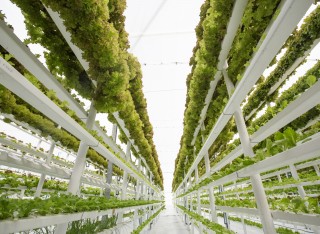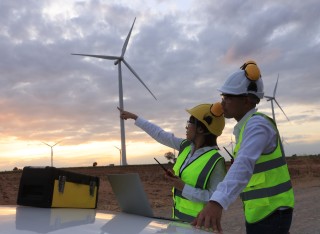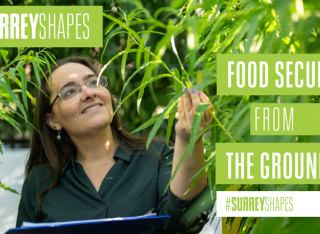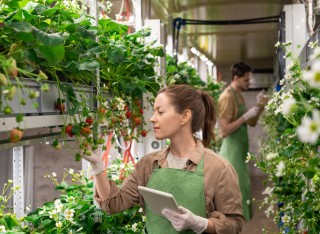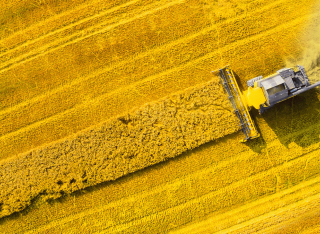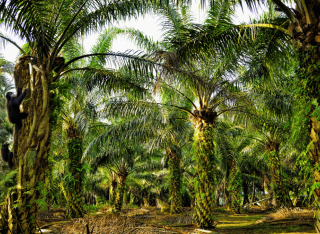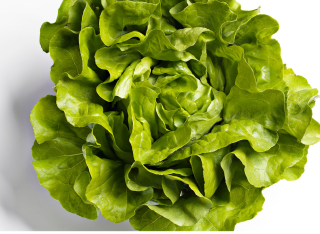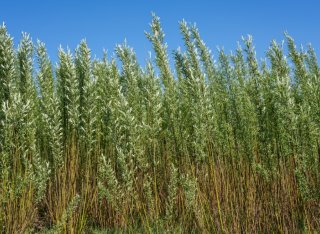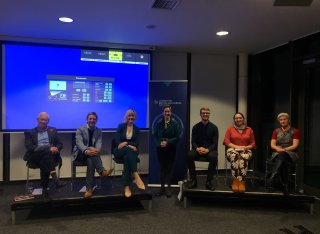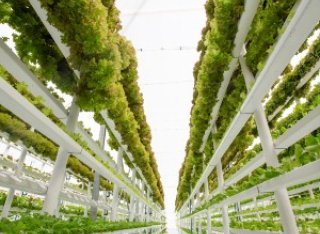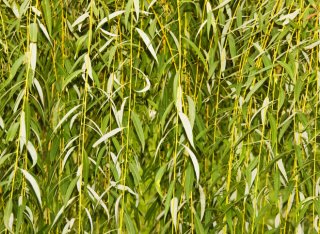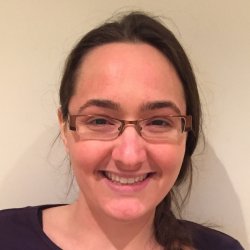
Dr Zoe M Harris
Academic and research departments
Centre for Environment and Sustainability, Institute for Sustainability, School of Sustainability, Civil and Environmental Engineering.About
Biography
Zoe’s core research focuses on how we can use land to provide food and energy provisions whilst minimising environmental impacts. She is currently assessing the feasibility of vertical farming and the potential it has to support the deployment of Bioenergy with Carbon Capture and Storage (BECCS).
Zoe leads the high profile Taeda Tech Project, a £4m interdisciplinary demonstration project looking at using a novel aeroponic technology to rapidly multiply biomass feedstocks. She has also recently kicked off the Vertical Farming to Improve UK Food System Resilience (VF-UKFSR) project assessing how vertical farming can increase UK food system resilience.
Beyond Surrey, Zoe has a significant international profile with notable positions in the International Energy Agency Bioenergy Technology Collaboration Programme. Representing the UK, Zoe is Head of Communications of the IEA Bioenergy Executive committee. Zoe also acts as the National Task Lead for the UK for Task 45 In this role she represents the UK research landscape and develops collaborative research for “Climate and Sustainability Effects of Bioenergy within the broader Bioeconomy”.
Zoe also has interests in the role of gender in the energy sector and is founder of the IVUGER network, which aims to support women and BAME women in UK energy research. She has undertaken work into the role of job advert wording on applicant diversity and has a new project assessing the role of diversity in decisions making for transport decarbonisation in Bradford.
Zoe is a keen science communicator and professionally trained actor. She uses her theatre training to deliver workshops on how scientists can better communicate their research.
Prior to joining CES, Zoe was a Research Fellow, and Research Associate, at the Centre for Environmental Policy, Imperial College London. She has worked in DEFRA as a Science Officer assessing GHG mitigation options for agriculture, and in BEIS and DfT as a Policy Adviser on the EU Emissions Trading System (ETS). Zoe completed her PhD and BSc Biology at the University of Southampton.
News
In the media
ResearchResearch interests
Zoe’s core research interest are in how we use land to provide food and energy provisions whilst minimising environmental impacts
Zoe is interested in the relationship between vertical farming and BECCS deployment. She is investigating if vertical farming is sustainable, and how this technology could support BECCS deployment through land sparing or potentially through supply of bioenergy crops. This work has formed part of a NERC industrial innovation fellowship, a PhD student project and the Taeda Tech Project.
Zoe’s research interest include:
- Bioenergy
- Bioenergy with Carbon Capture and Storage
- Land use change
- Eddy covariance
- Soil GHG emissions
- Vertical farming.
Zoe is also interested in the role of gender in the energy sector and received a UKERC Networking fund grant to found the IVUGER network – Increasing Visibility of Underrepresented Groups in Energy Research. This project provided training and seed funding for women in energy research, and conducted research into the impact of job wording on the diversity of applicants. Zoe recently won a DecarboN8 seed fund to develop methodology, which assesses the role of diversity in problem solving, using transport in Bradford as a case study.
Research projects
Vertical Farming to Improve UK Food System Resilience (VF-UKFSR) is an interdisciplinary project which looks to understand how vertical farming can support and increase the resilience of the UK food system.
- Start date: 1 Sept 2024
- End date: 30 Aug 2027
The Taeda Tech Project is a collaborative demonstration project led by the University of Surrey that is committed to developing a novel aeroponic technology which can rapidly grow woody crops.
- Start date: 4 April 2022
- End date: 31 March 2025.
Social enterprise as a catalyst for sustainable and healthy local food systemsThis interdisciplinary project will focus on the distinctive role of social enterprises (i.e. trading with a core social and environmental purpose), exploring and enhancing their unique contribution to food systems that are more inclusive, sustainable and healthy.
- Start date: July 2022
- End date: June 2024
This project will develop a rapid alternative cultivation system for dedicated bioenergy feedstocks.
- Start date: 1 August 2021
- End date: 31 January 2022.
This is a pilot project designed to better understand how collective decision making over resource allocation happens; how people work together and potential areas where conflict arises.
- Start date: 1 February 2021
- End date: 31 January 2022.
Research interests
Zoe’s core research interest are in how we use land to provide food and energy provisions whilst minimising environmental impacts
Zoe is interested in the relationship between vertical farming and BECCS deployment. She is investigating if vertical farming is sustainable, and how this technology could support BECCS deployment through land sparing or potentially through supply of bioenergy crops. This work has formed part of a NERC industrial innovation fellowship, a PhD student project and the Taeda Tech Project.
Zoe’s research interest include:
- Bioenergy
- Bioenergy with Carbon Capture and Storage
- Land use change
- Eddy covariance
- Soil GHG emissions
- Vertical farming.
Zoe is also interested in the role of gender in the energy sector and received a UKERC Networking fund grant to found the IVUGER network – Increasing Visibility of Underrepresented Groups in Energy Research. This project provided training and seed funding for women in energy research, and conducted research into the impact of job wording on the diversity of applicants. Zoe recently won a DecarboN8 seed fund to develop methodology, which assesses the role of diversity in problem solving, using transport in Bradford as a case study.
Research projects
Vertical Farming to Improve UK Food System Resilience (VF-UKFSR) is an interdisciplinary project which looks to understand how vertical farming can support and increase the resilience of the UK food system.
- Start date: 1 Sept 2024
- End date: 30 Aug 2027
The Taeda Tech Project is a collaborative demonstration project led by the University of Surrey that is committed to developing a novel aeroponic technology which can rapidly grow woody crops.
- Start date: 4 April 2022
- End date: 31 March 2025.
This interdisciplinary project will focus on the distinctive role of social enterprises (i.e. trading with a core social and environmental purpose), exploring and enhancing their unique contribution to food systems that are more inclusive, sustainable and healthy.
- Start date: July 2022
- End date: June 2024
This project will develop a rapid alternative cultivation system for dedicated bioenergy feedstocks.
- Start date: 1 August 2021
- End date: 31 January 2022.
This is a pilot project designed to better understand how collective decision making over resource allocation happens; how people work together and potential areas where conflict arises.
- Start date: 1 February 2021
- End date: 31 January 2022.
Supervision
Postgraduate research supervision
I am always happy to receive inquiries from students regarding PhD supervision around the topics of bioenergy, vertical farming, land use and ecosystem/soil GHG exchange.
Current PhD students
Michael Gargaro (2021 - ) - "The land sparing potential of vertical farming to support Bioenergy with Carbon Capture Storage (BECCS) deployment"
Sophie Tudge (2021 - )- "Assessing and projecting the effects of global land-use change for agriculture on biodiversity"
Patience Gaise - "Agroforestry adoption among cocoa farmers in Ghana – The voice of the cocoa farmer"
Abbos Khamidov (2022 -) - "Soil salinity monitoring, mapping, and assessment in Mirzaabad district, Syrdarya province, Uzbekistan"
Mollie Wilson (2022 - ) - "‘Good’ in context: An ethnographic investigation of public spaces in Portsmouth, UK."
Vicky Palumbo (2022 - ) - "“Optimising the growth of aeroponically grown SRC willow (Salix spp.) to be used for bioenergy”
Linqi Sun (2022 - ) - "Exploring the role of soilless cultivation for rapid bioenergy feedstock production technology in promoting the development of biomass"
Sotirios Sourmelis (2023 - ) - "Nature assessments of forest biomass removals", PDS student with Drax Group
Former PhD students
Nicole Luc (2022 - 2024) - "Renewable Energy Integration into Vertical Farming for Sustainable Urban Food Production" -> Now undertaking a PhD at Bristol University
Sarah Kakadellis (2019-2023) - LISS PhD Candidate, Centre for Environmental Policy, Imperial College London – “The feasibility of food waste and bioplastics co-digestion for industrial anaerobic digestion within a bioeconomy framework.” -> now a postdoc at UC Davis
MSc Supervision
I regularly supervise, and co-supervise, 3-4 MSc student dissertations projects each year.
Teaching
Director of the Practitioner Doctorate in Sustainability PhD/EngD course
Convening:
Teaching on:
- Environmental Science and Society (ENGM060)
- Sustainable Development: Applications (ENGM067)
- Sustainable Development: Foundations (ENGM064)
- Transitions to a Low Carbon Economy (ENGM184)
I am a Fellow of the Higher Education Academy (FHEA). I believe in taking an active learning approach and encouraging students to take ownership of their learning.
I have developed my own science communication workshops which take skills learned from actor training and apply them to science communication. I have delivered workshops to MSc, PhD and postdocs at the University of Southampton and Imperial College London.
Sustainable development goals
My research interests are related to the following:
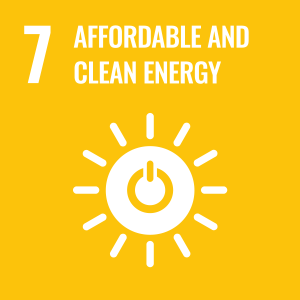


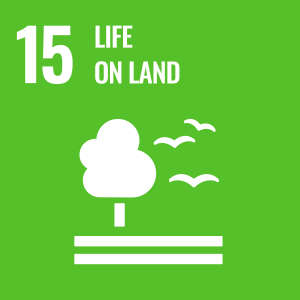
Publications
Climate change has accelerated the degradation of agricultural land, prompting innovation to develop and adapt current global production systems to accommodate more people with increased demand for resources. Novel technologies such as vertical farming offer an opportunity to secure climate-resilient food production. This study used Life Cycle Assessment to examine how the environmental impact of lettuce production in a commercial vertical farm compares with traditional field farming based on two contrasting UK farms and a Spanish farm. The vertical farm was found to have higher emissions in all impact categories except for water use; however, when using renewable energy sources, vertical farming was found to have higher, yet more comparable greenhouse gas emissions to field farming (0.93 kg CO2eq kg-1 lettuce (VF), 0.58 kg CO2eq kg-1 lettuce (UK 1 + 2)). Energy use (electricity or diesel), the choice of substrate, and soil emissions were the biggest hotspots for lettuce production in this study. Yields per area in vertical farming systems, however, were much higher than the field farming scenarios (97.3 kg m-2 (VF), 3.3 kg m-2 (average of field farms)), and the land sparing potential of vertical farming systems offers an opportunity to use spared land to potentially reap other environmental benefits while securing food production.
Bioenergy aims to reduce greenhouse gas (GHG) emissions and contribute to meeting global climate change mitigation targets. Nevertheless, several sustainability concerns are associated with bioenergy, especially related to the impacts of using land for dedicated energy crop production. Cultivating energy crops can result in synergies or trade-offs between GHG emission reductions and other sustainability effects depending on context-specific conditions. Using the United Nations Sustainable Development Goals (SDGs) framework, the main synergies and trade-offs associated with land use for dedicated energy crop production were identified. Furthermore, the context-specific conditions (i.e., biomass feedstock, previous land use, climate, soil type and agricultural management) which affect those synergies and trade-offs were also identified. The most recent literature was reviewed and a pairwise comparison between GHG emission reduction (SDG 13) and other SDGs was carried out. A total of 427 observations were classified as either synergy (170), trade-off (176), or no effect (81). Most synergies with environmentally-related SDGs, such as water quality and biodiversity conservation, were observed when perennial crops were produced on arable land, pasture or marginal land in the ‘cool temperate moist’ climate zone and ‘high activity clay’ soils. Most trade-offs were related to food security and water availability. Previous land use and feedstock type are more impactful in determining synergies and trade-offs than climatic zone and soil type. This study highlights the importance of considering context-specific conditions in evaluating synergies and trade-offs and their relevance for developing appropriate policies and practices to meet worldwide demand for bioenergy in a sustainable manner. •Synergies and trade-offs between SDGs from land use for bioenergy.•Synergies are related to water quality, soil quality and biodiversity conservation.•Trade-offs are related to water availability, food security and revenue.•Previous land use and feedstock are more relevant than other context conditions.
The scientific literature contains contrasting findings about the climate effects of forest bioenergy, partly due to the wide diversity of bioenergy systems and associated contexts, but also due to differences in assessment methods. The climate effects of bioenergy must be accurately assessed to inform policy-making, but the complexity of bioenergy systems and associated land, industry and energy systems raises challenges for assessment. We examine misconceptions about climate effects of forest bioenergy and discuss important considerations in assessing these effects and devising measures to incentivize sustainable bioenergy as a component of climate policy. The temporal and spatial system boundary and the reference (counterfactual) scenarios are key methodology choices that strongly influence results. Focussing on carbon balances of individual forest stands and comparing emissions at the point of combustion neglect system-level interactions that influence the climate effects of forest bioenergy. We highlight the need for a systems approach, in assessing options and developing policy for forest bioenergy that: (1) considers the whole life cycle of bioenergy systems, including effects of the associated forest management and harvesting on landscape carbon balances; (2) identifies how forest bioenergy can best be deployed to support energy system transformation required to achieve climate goals; and (3) incentivizes those forest bioenergy systems that augment the mitigation value of the forest sector as a whole. Emphasis on short-term emissions reduction targets can lead to decisions that make medium- to long-term climate goals more difficult to achieve. The most important climate change mitigation measure is the transformation of energy, industry and transport systems so that fossil carbon remains underground. Narrow perspectives obscure the significant role that bioenergy can play by displacing fossil fuels now, and supporting energy system transition. Greater transparency and consistency is needed in greenhouse gas reporting and accounting related to bioenergy.
This model has investigated the potential of using vertical farming (VF) systems to spare land for planting dedicated biomass crops for bioenergy in the UK and Spain (Miscanthus and SRC Willow). Using the DND-C model, spared land has been modelled to understand the potential yields we may see from areas where lettuce crops have previously been cultivated in the field, in both the UK and Spain, for consumption by the UK market. This poster presents the methodological developments of the model, with land use savings of 8536 ha (~0.0005% of current arable land in the UK and Spain) found so far. Further improvements to the model will occur, expanding the scope to absorb more regions, and more food crops to understand the land sparing potential of VF.
Global population rise, increased rural to urban migration, climate change and conflict have placed strain on global trade and food supply chains. Vertical farming (VF) is a relatively novel method for cultivating many fresh fruits and vegetables, and often is claimed to have lower environmental impacts than field cultivation. However, to date there are few studies utilising primary data which have evaluated the environmental impact VF may have. This study utilised Life Cycle Assessment (LCA) to evaluate the environmental impact of lettuce production in a commercial vertical farm in the UK. This was compared with data from the literature on the impacts of lettuce in field cultivation. Scenarios were also examined to evaluate the impact of VF systems with varying electricity sources, and waste, water and nutrient management options. The VF was found to have a similar or lower Climate Change impact than field cultivation, depending on energy source used. VF had a slightly higher environmental impact than field cultivation in some other environmental impact categories such as freshwater eutrophication potential and acidification potential. Electricity demand and the medium used for ‘plugs’ in the VF were found to be the main hotspots of the system. The results of this study provide insights on the environmental impact and resource efficiency of VF, feasibility for larger scale deployment, and provide further empirical evidence to support the claims made previously in the literature. [Display omitted] •An LCA of a commercial vertical farm in the UK using primary production data.•System hotspots were electricity requirements and cultivation substrate used.•Climate Change impacts reduced 6-fold by using renewable energy electricity.•Overall emissions profile is comparable to field-based lettuce cultivation.•Vertical farming systems offer substantial land sparing potential.
To combat climate change, bioenergy is expected to play a more substantial role in the global energy mix, necessitating the expansion of energy crop plantations during the 21st century. Low-quality or abandoned agricultural land is commonly proposed for growing energy crops. However, restoring such agricultural land back to natural vegetation is also key for global biodiversity conservation and carbon sequestration. Thus, understanding the ecological implications of land-use changes involving both energy crop plantations and restoration is required. Here, we use biodiversity data to calculate the Biodiversity Intactness Index (BII) in different land uses, including energy crop plantations. We combine our BII models with maps of land use, crop yields and priority areas for restoration to estimate the effects on BII of changes in land use, from the current day, due to bioenergy expansion. We then compare the effects on BII of replacing either any land with energy crops, or only existing agricultural land that is a priority for restoration. Finally, we contrast the effects on BII of planting energy crops versus restoring natural vegetation in priority areas for restoration. Planting energy crops in places with relatively high amounts of natural vegetation and high BII would substantially reduce BII. Planting energy crops only on existing agricultural land that is a priority for restoration would result in less negative effects on BII than planting such crops in high BII areas, and small increases in BII in places with less remaining natural vegetation. However, restoring natural vegetation in priority areas, rather than expanding energy crops, would result in better outcomes for BII. Contrasting the spatial effects on BII of planting energy crops compared with restoring natural vegetation highlights places where energy crops could be the least detrimental to BII, such as Central Europe and the east coasts of the USA and China. Synthesis and applications. While restoration is the best strategy for biodiversity, planting energy crops on agricultural land rather than replacing natural vegetation could minimise losses in biodiversity intactness. However, achieving targets for bioenergy, climate change and restoration will require strategic land-use planning to minimise ecological compromises. While restoration is the best strategy for biodiversity, planting energy crops on agricultural land rather than replacing natural vegetation could minimise losses in biodiversity intactness index. However, achieving targets for bioenergy, climate change and restoration will require strategic land-use planning to minimise ecological compromises.image
Within a circular bioeconomy, biodegradable bioplastics (BBPs) have been promoted in fast-moving consumer goods to contribute towards closed-loop material flows. Consumers play a key role as enablers of these flows, provided they accept, understand and dispose of BBPs appropriately. Informed by focus groups, a framework combining multiple behavioural and design theories was developed to identify and structure systemic factors influencing the flow of BBPs through the consumption phase, with a focus on disposal. An exploratory network analysis based on a survey of 457 and 284 participants from two universities in the United Kingdom and the United States was then conducted to explore the interplay between factors and intentions to dispose of BBPs in different waste streams. Access to adequate organic waste infrastructure and pre-existing knowledge of BBP terminology and disposal routes were most strongly associated with intentions to dispose of BBPs alongside food waste. Mapping and facilitating consumer behaviour in tackling BBP waste is pivotal in designing sustainable systems for these materials.
There is increasing interest in the use of nonfood second-generation lignocellulosic feedstocks and a move away from food crops for bioenergy applications, but questions still remain on sustainability. Empirical data are needed to quantify the GHG balance of land-use transition to lignocellulosic bioenergy cropping systems, to inform lifecycle analyses and aid model validation. The aim of this project 'Ecosystem Land Use Modeling and Soil Carbon GHG Flux Trial' is to produce a framework for predicting the sustainability of bioenergy deployment across the UK. This GB£4m consortium project is commissioned and funded by the Energy Technologies Institute, UK.
The Intergovernmental Panel on Climate Change (IPCC) report that to limit warming to 1.5 °C, Bioenergy with Carbon Capture and Storage (BECCS) is required. Integrated assessment models (IAMS) predict that a land area between the size of Argentina and Australia is required for bioenergy crops, a 3–7 time increase in the current bioenergy planting area globally. The authors pose the question of whether vertical farming (VF) technology can enable BECCS deployment, either via land sparing or supply. VF involves indoor controlled environment cultivation, and can increase productivity per unit land area by 5–10 times. VF is predominantly being used to grow small, high value leafy greens with rapid growth cycles. Capital expenditure, operational expenditure, and sustainability are challenges in current VF industries, and will affect the ability to utilise this technology for other crops. The authors argue that, whilst challenging, VF could help reach wider climate goals. Application of VF for bioenergy crops could be a game changer in delivering BECCS technologies and may reduce the land footprint required as well as the subsequent associated negative environmental impacts. VF bioenergy could allow us to cultivate the future demand for bioenergy for BECCS on the same, or less, land area than is currently used globally.
A systematic review and meta-analysis were used to assess the current state of knowledge and quantify the effects of land use change (LUC) to second generation (2G), non-food bioenergy crops on soil organic carbon (SOC) and greenhouse gas (GHG) emissions of relevance to temperate zone agriculture. Following analysis from 138 original studies, transitions from arable to short rotation coppice (SRC, poplar or willow) or perennial grasses (mostly Miscanthus or switchgrass) resulted in increased SOC (+5.0 +/- 7.8% and +25.7 +/- 6.7% respectively). Transitions from grassland to SRC were broadly neutral (+3.7 +/- 14.6%), whilst grassland to perennial grass transitions and forest to SRC both showed a decrease in SOC (-10.9 +/- 4.3% and -11.4 +/- 23.4% respectively). There were insufficient paired data to conduct a strict meta-analysis for GHG emissions but summary figures of general trends in GHGs from 188 original studies revealed increased and decreased soil CO2 emissions following transition from forests and arable to perennial grasses. We demonstrate that significant knowledge gaps exist surrounding the effects of land use change to bioenergy on greenhouse gas balance, particularly for CH4. There is also large uncertainty in quantifying transitions from grasslands and transitions to short rotation forestry. A striking finding of this review is the lack of empirical studies that are available to validate modelled data. Given that models are extensively use in the development of bioenergy LCA and sustainability criteria, this is an area where further longterm data sets are required. (C) 2015 The Authors. Published by Elsevier Ltd. This is an open access article under the CC BY license
The effect of a transition from grassland to second-generation (2G) bioenergy on soil carbon and greenhouse gas (GHG) balance is uncertain, with limited empirical data on which to validate landscape-scale models, sustainability criteria and energy policies. Here, we quantified soil carbon, soil GHG emissions and whole ecosystem carbon balance for short rotation coppice (SRC) bioenergy willow and a paired grassland site, both planted at commercial scale. We quantified the carbon balance for a 2-year period and captured the effects of a commercial harvest in the SRC willow at the end of the first cycle. Soil fluxes of nitrous oxide (N2O) and methane (CH4) did not contribute significantly to the GHG balance of these land uses. Soil respiration was lower in SRC willow (912 +/- 42gCm(-2)yr(-1)) than in grassland (1522 +/- 39gCm(-2)yr(-1)). Net ecosystem exchange (NEE) reflected this with the grassland a net source of carbon with mean NEE of 119 +/- 10gCm(-2)yr(-1) and SRC willow a net sink, -620 +/- 18gCm(-2)yr(-1). When carbon removed from the ecosystem in harvested products was considered (Net Biome Productivity), SRC willow remained a net sink (221 +/- 66gCm(-2)yr(-1)). Despite the SRC willow site being a net sink for carbon, soil carbon stocks (0-30cm) were higher under the grassland. There was a larger NEE and increase in ecosystem respiration in the SRC willow after harvest; however, the site still remained a carbon sink. Our results indicate that once established, significant carbon savings are likely in SRC willow compared with the minimally managed grassland at this site. Although these observed impacts may be site and management dependent, they provide evidence that land-use transition to 2G bioenergy has potential to provide a significant improvement on the ecosystem service of climate regulation relative to grassland systems.
Controlled environment agriculture (CEA) has some clear advantages over traditional farming, such as: reliable and consistent production capability; efficiency in water and space use; reducing the use and runoff of fertiliser and pesticides; etc. As such CEA can greatly benefit from the CAPE (computer-aided process engineering) approach – cross-fertilization of these two apparently distinct areas may result in new methods and applications to improve CEA and process engineering, with potentially significant contribution to circular economy. In this paper, we discuss several important aspects of CEA drawing from our own experiences in aquaculture and aeroponics, including product development, process design and process operation, and the potential contribution of CAPE. Finally, we postulate a systems platform for CEA, aiming to foster a long-lasting partnership between the two scientific communities.
Climate change-related impacts have hampered the productivity of agricultural lands in recent times, affecting food security globally. Novel technology-based agricultural production systems such as controlled-environment agriculture (CEA) are a way to reduce the impact of climatic variation and pests that harm current global crop production and ensure consistent crop development. These systems often use artificial lighting and soilless mediums to produce crops. This meta-analysis has investigated the key influencing factors on crop production within these systems, using previous studies on lettuce (the most cultivated crop in these systems) to understand what affects yield within CEA. This analysis has found that on average, CEA systems yield twice that of field-based agriculture (3.68 kg m −2 vs. 1.88 kg m −2), with the most influencing factors being the variety of cultivars grown, the season, the nutrient delivery method, and the lighting type. The cultivation time for this study was 40 days, with 94% of papers having trial periods of 70 days or less, much lower than field-based agriculture (60–120 days). Vertical farming (stacked vertical CEA cultivation) studies were found to especially drive up yield per area (6.88 kg m −2). The results of this meta-analysis are useful for starting to understand the key influencing factors on CEA growth and highlight the breadth of research ongoing in the CEA industry.
Bioenergy has been identified as a key contributor to future energy scenarios consistent with the Paris Agreement targets, and is relied upon in scenarios both with and without bioenergy with carbon capture and storage, owing to the multiple ways in which bioenergy can substitute fossil fuels. Understanding the environmental and societal impacts of land-use change (LUC) to bioenergy crops is important in determining where and how they could be deployed, and the resulting trade-offs and co-benefits. We use systematic review and meta-analysis to assess the existing literature on two poorly understood impacts of this LUC that are likely to have an important effect on public acceptability: cultural ecosystem services and biodiversity. We focus on the impact of LUC to non-food bioenergy crops on agricultural landscapes, where large-scale bioenergy planting may be required. Our meta-analysis finds strong benefits for biodiversity overall (up 75% +/- 13%), with particular benefits for bird abundance (+81% +/- 32%), bird species richness (+100% +/- 31%), arthropod abundance (+52% +/- 36%), microbial biomass (+77% +/- 24%), and plant species richness (+25% +/- 22%), when land moves out of either arable crops or grassland to bioenergy production. Conversions from arable land to energy trees led to particularly strong benefits, providing an insight into how future LUC to non-food bioenergy crops could support biodiversity. There were inadequate data to complete a meta-analysis on the effects of non-food bioenergy crops on cultural ecosystem services, and few generalizable conclusions from a systematic review of the literature, however, findings highlight the importance of landscape context and planting strategies in determining impact. Our findings demonstrate improved farm-scale biodiversity on agricultural land with non-food bioenergy crops, but also limited knowledge concerning public response to this LUC, which could prove crucial to the successful expansion of bioenergy to meet the Paris targets.
Tree plantations are expanding globally to satisfy demands for wood, food, energy, oil and other ecosystem services, often replacing primary vegetation. Plantations are generally less biodiverse than primary vegetation, yet the effects of plantation age on biodiversity are not well understood. More accurate estimations of biodiversity within plantations over time could improve predictions of the ecological effects of tree planting, guiding more sustainable land use and management decisions. Here, we assess the effects of plantation age on the abundance and number of species of invertebrates, birds, plants, mammals, amphibians, reptiles and lichens, and on compositional similarity to minimally-used primary vegetation. We find that plantations usually support fewer species than both minimally-used primary vegetation and mature secondary vegetation, fewer individuals, and some novel species (i.e. species not also found in primary vegetation). We also find that, on a global scale, plantation age has positive effects on species richness, the abundance of individuals, and compositional similarity to primary vegetation. However, geographic realm, biome, management intensity and plantation type influence the biodiversity trends. We also include a case study for oil palm, showing that species richness increases with oil palm plantation age. Nevertheless, plantations typically remain less biodiverse than natural vegetation even thirty years after planting, especially in the tropics, where compositional similarity between plantations and minimally-used primary vegetation remains approximately 20% lower than the non-tropics. Our results highlight the negative ecological consequences of establishing new plantations in place of primary vegetation or restoration, yet we also reveal spatio-temporal differences in plantation biodiversity.
Following the BBC's Blue Planet II nature documentary series on marine ecosystems, plastic packaging has come under public fire, with consumers demanding greener alternatives. The biodegradable properties of some bioplastics have offered a potential solution to the global challenge of plastic pollution, while enabling the capture of food waste through anaerobic digestion as a circular and energy-positive waste treatment strategy. However, despite their increasing popularity, currently bioplastics are being tested in environments that do not reflect real-life waste management scenarios. Bioplastics find their most useful, meaningful and environmentally-sound application in food packaging-why is there so little interest in addressing their anaerobic co-digestion with food waste? Here, we provide a set of recommendations to ensure future studies on bioplastic end-of-life are fit for purpose. This perspective makes the link between the environmental sustainability of bioplastics and the role of food waste anaerobic digestion as we move towards an integrated food-energy-water-waste nexus. It shines light on a novel outlook in the field of bioplastic waste management while uncovering the complexity of a successful path forward. Ultimately, this research strives to ensure that the promotion of bioplastics within a circular economy framework is supported across waste collection and treatment stages.
Abstract Most decarbonization scenarios of energy systems necessitate more than 500 Mha of land converted to non-food bioenergy crops to provide both energy substitutes for fossil fuels and negative emissions through bioenergy with carbon capture and storage (BECCS). Understanding the environmental and societal impact of this significant land-use change (LUC) is important in determining where and how bioenergy crops should be deployed, and the trade-offs and co-benefits to the environment and society. Here, we use two systematic reviews and a meta-analysis to assess the existing literature on impacts that are likely to have an important effect on public perceptions of the acceptability of such land use change: biodiversity and amenity value. We focus on the impact of LUC to non-food bioenergy crops on agricultural landscapes, where large-scale bioenergy planting may be required. Our meta-analysis finds strong benefits for biodiversity overall (up 75 % ± 13 %), with particular benefits for bird abundance (+ 81 % ± 32 %), bird species richness (+ 100 % ± 31 %), arthropod abundance (+ 52 % ± 36 %), microbial biomass (+ 77 % ± 24 %), and plant species richness (+ 25 % ± 22 %), when land moves out of either arable crops or grassland to bioenergy production. Conversions from arable land to energy trees led to particularly strong benefits, providing an insight into how future LUC to bioenergy crops could support biodiversity. There were inadequate data to complete a meta-analysis on the effects of bioenergy crops on landscape amenity value, and few generalizable conclusions from a systematic review of the literature, however, findings highlight the importance of landscape context and planting strategies in determining amenity values. Our findings demonstrate improved farm-scale biodiversity on agricultural land with bioenergy crops, but also limited knowledge concerning public response to this land use change which could prove crucial to the effective deployment of bioenergy crops for BECCS. Competing Interest Statement The authors have declared no competing interest.
Wide-scale application of biochar to soil has been suggested as a mechanism to offset increases in CO 2 emissions through the long-term sequestration of a carbon rich and inert substance to the soil, but the implications of this for soil diversity and function remain to be determined. Biochar is capable of inducing changes in soil bacterial communities, but the exact impacts of its application are poorly understood. Using three European sites [UK SRC, short rotation coppice, French grassland (FR) and Italian SRF, short rotation forestry (IT)] treated with identical biochar applications, we undertook 16S and ITS amplicon DNA sequencing. In addition, we carried out assessments of community change over time and N and P mobilization in the UK. Significant changes in bacterial and community structure occurred due to treatment, although the nature of the changes varied by site. STAMP differential abundance analysis showed enrichment of Gemmatimonadete and Acidobacte-ria in UK biochar plots 1 year after application, whilst control plots exhibited enriched Gemmataceae, Isosphaer-aceae and Koribacteraceae. Increased mobility of ammonium and phosphates was also detected after 1 year, coupled with a shift from acid to alkaline phosphomonoesterase activity, which may suggest an ecological and functional shift towards a more copiotrophic ecology. Italy also exhibited enrichments, in both the Proteobacte-ria (driven by an increase in the order Rhizobiales) and the Gemmatimonadetes. No significant change in the abundance of individual taxa was noted in FR, although a small significant change in unweighted UNIFRAC occurred, indicating variation in the identities of taxa present due to treatment. Fungal β diversity was affected by treatment in IT and FR, but was unaffected in UK samples. The effects of time and site were greater than that of biochar application in UK samples. Overall, this report gives a tantalizing view of the soil microbiome at several sites across Europe and suggests that although application of biochar has significant effects on microbial communities, these may be small compared with the highly variable soil microbiome that is found in different soils and changes with time.
Consumers are becoming increasingly attuned to sustainability issues in the food supply chain and demanding retailers to keep pace with their changing expectations. The visual nature of plastic pollution has strengthened public awareness of the environmental impact of plastic packaging. Against this backdrop, biodegradable plastics have been promoted as an alternative to conventional polymers, offering the potential to tackle hard-to-recycle plastics while being compatible with food waste recycling. Given increased recognition of food waste as an untapped resource worldwide and the incoming policy mandating separate collections for household and commercial food waste across the EU from 2023, anaerobic digestion is a particularly promising strategy and can make an important contribution to the transition to circular waste management practices. However, currently no industrial standard exists for 'digestible' packaging. Our research addresses stakeholder attitudes towards the treatment of biodegradable plastic packaging in food waste anaerobic digestion. We conducted 19 semi-structured interviews with a range of stakeholders, including the biowaste recycling sector, retail, governmental bodies and environmental charities. Qualitative data were categorised into thematic nodes based on inductive and deductive strategies. Content analysis showed significantly divergent views on biodegradable plastics. Though most respondents acknowledged the merits of biodegradable plastics, concerns over their compatibility with the current anaerobic digestion infrastructure (e.g. systematic depackaging, retention times) and their ultimate biodegradability were raised. In light of these issues, potential solutions are discussed and the role that legislation and consumer education can play in ensuring that the anaerobic digestion sector can accommodate these novel materials are highlighted.
This article evaluates the suitability of the ECOSSE model to estimate soil greenhouse gas (GHG) fluxes from short rotation coppice willow (SRC-Willow), short rotation forestry (SRF-Scots Pine) and Miscanthus after land-use change from conventional systems (grassland and arable). We simulate heterotrophic respiration (R h), nitrous oxide (N 2 O) and methane (CH 4) fluxes at four paired sites in the UK and compare them to estimates of R h derived from the ecosystem respiration estimated from eddy covariance (EC) and R h estimated from chamber (IRGA) measurements, as well as direct measurements of N 2 O and CH 4 fluxes. Significant association between modelled and EC-derived R h was found under Miscanthus, with correlation coefficient (r) ranging between 0.54 and 0.70. Association between IRGA-derived R h and modelled outputs was statistically significant at the Aberys-twyth site (r = 0.64), but not significant at the Lincolnshire site (r = 0.29). At all SRC-Willow sites, significant association was found between modelled and measurement-derived R h (0.44 ≤ r ≤ 0.77); significant error was found only for the EC-derived R h at the Lincolnshire site. Significant association and no significant error were also found for SRF-Scots Pine and perennial grass. For the arable fields, the modelled CO 2 correlated well just with the IRGA-derived R h at one site (r = 0.75). No bias in the model was found at any site, regardless of the measurement type used for the model evaluation. Across all land uses, fluxes of CH 4 and N 2 O were shown to represent a small proportion of the total GHG balance; these fluxes have been modelled adequately on a monthly time-step. This study provides confidence in using ECOSSE for predicting the impacts of future land use on GHG balance, at site level as well as at national level.

